Songs from Rappahannock County, Virginia by MacEdward Leach and Horace P. Beck
The Journal of American Folklore, Vol. 63, No. 249 (Jul. - Sep., 1950), pp. 257-284
SONGS FROM RAPPAHANNOCK COUNTY, VIRGINIA
By MACEDWARD LEACH AND HORACE P. BECK
University of Pennsylvania (Leach) Temple University (Beck)
DURING THE WINTER OF 1947, the junior author recorded the songs of Stanley Russell Pendleton, a Negro living in Newport, Rhode Island. The informant suggested that a trip to Huntly, Rappahannock County, Virginia, might prove a profitable venture. Accordingly we proceeded thither in the spring of the same year, equipped with a recording machine and discs supplied by the Folk Music Department of the Library of Congress, Duncan Emrich, Chief. The material presented here was gathered in a week's time within a radius of ten miles from "Little" Washington, Virginia. The area was bounded on the east by Amisville, on the north by Chester's Gap and on the south by Thompson's Gap. Within this semicircle one finds a wide range of topography. At Amisville there are rich lowlands, at Huntly foothills, and at both Gaps, mountains. At Amisville and at Huntly the roads are good and communications excellent; whereas the communities at Chester's Gap are almost isolated, and those at Thompson's completely so. The nearest town where any industrial employment or commercial entertainment may be obtained is Front Royal, nineteen miles north of Chester's Gap and therefore, not easily accessible to all. Accordingly, the people are dependent to a large measure on their own resources for entertainment. From the mountains to the south and west a large number have been forced to move since their lands have been confiscated by the government to make the Park. Consequently many of the older mountain dwellers have been scattered, and were not readily available, the very ones who would be the most valuable to any one hunting old songs, since they lived in these more remote and isolated areas.
Unfortunately for the folklorist seeking songs and ballads, the region has been invaded by an evangelical spirit who has caused a reversion of culture that smacks strongly of the more unfortunate aspects of medieval times. Through his ministry most of the community has become converted to the "true path." The "true path" consists of putting aside all terrestrial pleasures in the hope of attaining rewards in the next world. Of the things that are taboo, the singing of folk songs and ballads, and social gatherings, other than for religious purposes, seems to head the list. Still, custom is a hard thing to stamp out, and although the old earthly songs go, some of the tunes and the sentiment remain in the hymns and spirituals.
Many of the people possess either radios or phonographs, and automobiles, all three of which serve, to a certain degree, to arouse new and outside interests to supplant the more traditional ones. However, neither the radio nor the phonograph is entirely detrimental from the ballad hunter's point of view. It is not the matter of a moment to change the taste acquired over centuries and therefore, hillbilly music is what they like and listen to. From Wheeling and Nashville, they are given a liberal supply of modern mountain music and a smattering of the better known Child ballads, as well as a few American ballads and folk songs. The same is true of the phonograph for recordings of the Carter family still are found. However, these agencies seem to be of more benefit in preserving the hillbilly type of music and directing it into newer channels, than in preserving the traditional texts. Occasionally, one runs into a popular folksong, like "Boll Weavil," where it is hard to decide whether the song is indigenous to the region or part of a piece heard over the radio or from a record in the hands of a friend. Still, it must be admitted that such commercial entertainment is far better suited to the preservation of an older culture than the hot jazz of our more sophisticated societies. That the traditional texts are fast fading is all too evident when one considers the fact that all but one of the singers recorded was past middle age and most had to delve deep into past memories to find the material. In fact, one informant, Mrs. Williams, took two days to remember "Lady Margaret" and could not remember when she had last sung it. Everyone stated that his parents, dead a quarter of a century, remembered the songs well.
It is not the primary purpose of this paper to add to the steadily increasing store of variants of themes already known. Rather it is the intention to show the scope of songs sung in a specific region and to recount only startling variants of the better known songs. To this end, recordings of "Boll Weavil," "John Henry," "The Gallows Tree," "Froggie," "Down in the Valley," etc., have been omitted. Finally, it must be stated that the collection given here is only the partial stirring of a pool of general folklore. The extent of the songs in the region has by no means been completely explored. No attempt was made to collect folklore, and religious songs have been entirely omitted. There is a wealth of herbals, superstitions, folk history, signs, symbols and religious song still to be gathered. It is the hope of the authors to return to this region and to study it until the whole pattern of the folk culture becomes apparent. We used eight informants, all except one, middle-aged or older. Silas Pendleton, forty-five years of age, was born at Huntly, Rappahannock County, Virginia, and lived there for many years. There he learned a large stock of folk songs and ballads. When recorded he was living at Newport, R. I. He knew all the usual songs and was able to pick most of them out on the guitar, but he rarely sings any more; some of the songs he said he had not sung in years. Mrs. Josh Williams, eighty years old, of Huntly, sang "Lady Margaret" after working the song out of her memory. She and her husband had known many more songs, but they remember only scraps of them now.
"Shack" Hunter, a Negro, well past middle age, is recognized around "Little" Washington, Va. as one of the best of the Negro singers in the vicinity, but he prefers to sing songs learned from the radio, though he knows many of the older songs. J. Mahoney and his brother, W. H. Mahoney live at Chester's Gap at the end of a difficult mountain road. Both know many songs. Mr. J. Mahoney especially has the reputation through the mountains of being an exceptionally fine singer. But he has "retired from the world," having embraced the Pentacostal faith, and consequently it is very difficult to get him to sing any but religious songs. His brother was more amenable, but alas his memory and voice were uncertain. Mr. Henry Whorton, living back in the country beyond Amisville, is an old-time fiddler and banjoist. He knows snatches of many songs and ballads and in more detail many banjo tunes.
All of Henry Whorton's thirteen children can sing or pick a guitar except one. The most skillful is son Charles, aged twenty-three. He has learned some of the old songs from his father but prefers generally the modern songs of the radio. Henry Gore, aged fifty-five, was recorded in Philadelphia. He was born and raised in Smedley, Rappahannock County, Virginia. From his father he learned many songs, a few of which he still remembers though he never sings them any more. Henry Pullen, sixty years of age, lives on a mountain behind Smedley. He plays a banjo and knows a great stock of banjo tunes, but his stock of ballads is meagre. His mother, he says, could sing ballads from morning until night and never repeat herself. Folk songs and ballads in Rappahannock County are rapidly dying out; when the present older generation is gone there will be none left who know them. A few old songs may linger on, transformed by influence of radio singing; a few new ones may be made on the old patterns to record and dramatize local events, but the old culture is rapidly going.
"Rich Lady from London" ("The Brown Girl") (Child 295)
This is not the conventional type, in that here the boy refuses the girl who then puts the best face possible on the situation before dying. It also suggests Child B in the number of rings, but unlike Child B, the rings are refused. Finally, the sea element is almost entirely lost except for the incidental vocabulary. Davis, Traditional Ballads of Virginia, p. 537; Brewster, Ballads and Songs of Indiana, p. 164; Sharp, English Folksongs of the Southern Appalachians, I, 295; M. E. Henry, Still More Ballads and Folksongs from the Southern Highlands; JAF, 45 (1932), 53. For a discussion of the relation of this ballad to Child 295, see Hudson, Folk-Songs of Mississippi, p. I28, and Kirkland, Southern Folklore Quarterly, 2 (1938), 79. Barry, Eckstorm, and Smythe, British Ballads from Maine, ch. 2. (W.H.M.)
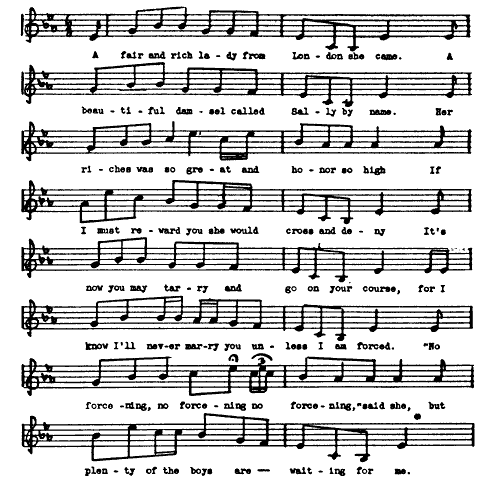
1. There's a fair English Lady, from London she came
A beautiful damsel, called Sally by name.
2. Her riches were so great, and her honor so high
If I must reward you, she would cross and deny.
3. It's now you may tarry, and go on your course
For I know I'll never marry you, unless I am forced.
4. "No forc'ning, no forc'ning, no forc'ning," said she,
For there's plenty other boys, are waiting for me.
5. For twenty-four days has rolled and passed by
This beautiful damsel took sick at last.
6. She was sick and low. She knew not for a while
She sent for this young man, she once had denied.
7. It's, "Am I the doctor, can kill or can cure?"
Or it's, "Am I this young man, you once had denied?"
8. "Yes, you are the doctor, can kill or can cure,
And without your assistance, I'm ruined I'm sure."
9. She pulled from her fingers, gold diamond rings three
Saying, "Take them and wear them, while you're dancing over me.
10. "No keep your rings, Sally, and lie them on your breast,
For I'll dance on your grave, Love, while you're lying at rest.
11. Well it's Sally is dead, and you all may be exposed
To some of her relations, she has willed her fine clothes.
12. She has taken her lodgings, in the banks of cold clay
Her body, cheeks, lie a-moldering away.
* In the sixth and fourteenth measures, Mr. Mahoney gets an extra beat. This has been compensated for by the pause in measure fourteen and the dotted eighth and thirty-second notes in measure six. His rhythm, other than this, is pretty good. The music is transcribed by Antoinette Manos and Helen Fernald.
"Lord Thomas" ("Lord Thomas and Fair Annet") (Child 73)
Greatly compressed, the song emphasizes only the riddle portion of the ballad. It is interesting to note in this, as in other ballads, the rationalization of the language and the fossilization of words where their meaning has become lost as in "he tangled all at the ring." A. K. Davis, Jr., Traditional Ballads of Virginia, p. 191. (W.H.M.) i. 693.
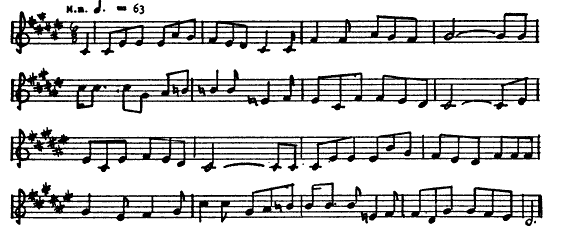
1. Lord Thomas abeing a bold young man,
The keeper of King's Hall.
Fair Eleanor being as fair skinned girl,
As ever the sun shined on,
As ever the sun shined on.
2. Come riddle, dear Mother, come riddle,
Come riddle us both in one.
It's must I marry fair Eleanor alone,
Or bring the Brown Girl home?
Or bring the Brown Girl home?
3. "The Brown Girl she has house and lands,
Fair Ellen, she has none.
And I would advise you, my good Will,
To bring the Brown Girl home,
To bring the Brown Girl home."
4. He saddled his horse,
He bridled it well,
Put on his finger ring.
And every city that he rode through,
He was taken to be some King,
He was taken to be some King.
5. He rode to Fair Ellen's Hall.
He tangled all at the ring.
And none so ready, but Fair Ellen herself,
To rise and let him in,
To rise and let him in.
6. "What news, what news, have you brought me?
What news, what news," said she.
"I've come to ask you to my weddin'.
Bad news, bad news," said he.
"Bad news, bad news," said he.
"Lady Margaret" ("Fair Margaret and Sweet William") (Child 74)
This is like the typical story except that the ghost motif is entirely absent from the poem and William goes in daylight to see his love. No mention other than the first is made of his wife. However, it is in the latter part of the poem that the widest variations occur. In the last stanza particularly we notice a change in the rose-brier motif. William's grave produces nothing, while Lady Margaret's grave grows a brier that reaches over to Sweet William's breast and dies, for some reason, before it can tie itself in a true love's knot. Alone of all the variants, this one appears to point out an unrequited love, even after death. A. K. Davis, Jr., Traditional Ballads of Virginia, p. 221; Phillips Barry, British Ballads from Maine, p. 134; Helen Flanders, Vermont Folk-
Songs and Ballads, p. 2I3. (Mrs. J.W.)
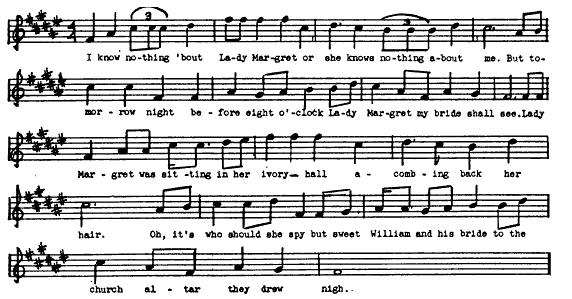
1 . I know nothing 'bout Lady Margaret,
Or she knows nothing about me.
But tomorrow night, before eight o'clock,
Lady Margaret my bride shall see.
2. Lady Margaret was sitting in her ivory hall,
A combing back her hair.
Oh it's who should she spy,
Twas Sweet William and his bride,
To the church altar as they drew nigh.
3. Down she threw her ivory comb,
And back she threw her hair.
And made a bow by her own bowing door, (bower door)
And was never seen there any more.
4. The night abeing gone an' the days a coming on,
When all men were awake.
Sweet William arose, put on his clothes,
Lady Margaret determined to find.
5. He rode, and he rode, and he rode,
And he rode 'till he came to her father's house.
There was no one but Lady Margaret's brother,
For to rise and let him in.
6. "Good morning, Sir, Good morning, Sir.
Oh pray, how do you do?
Oh which a way is Lady Margaret
Or is she now with thee?"
7. "She is neither in her clothes chamber,
Neither in her hall.
She is now in her closed coffin,
Stretched out by the side of the wall."
8. "Unfold, unfold those winding sheets,
And all that is so fine,
And let me kiss those cold clay lips
That oft times has kissed mine."
9. Three times he kissed her cold clay lips.
Three times he kissed her cheek.
Three times he kissed her cold clay lips,
And that enticed him in.
10. Lady Margaret died for pure, pure love.
Sweet William died for sorrow.
Lady Margaret died oh like today,
Sweet William died tomorrow.
11. And it sprung a red rose out of Lady Margaret's grave,
And it grown on Sweet William's breast.
If it had a grown but one more year
It would'a tied in a true love's knot.
"Barbara Allen" (Child 84)
Although incomplete in that it leaves out the stanza about the ball and differs in minor respects elsewhere, this is a typical version. It is included for a twofold reason, first because the music and the singing are superb and, most important, that of all the ballads collected, this and this alone seemed to be acceptable to the present-day youth. Although Mr. Wharton, senior, knew many songs, his twenty-three year old son sang only this one traditional ballad, and it was the only one that enjoyed any current popularity. A. K. Davis, Jr., Traditional Ballads of Virginia, p. 302. (C.W.)

1. 'Twas in the merry month of June,
When the green buds they were swellin',
William on his deathbed lay,
For the love of Bobr'y Allen.
2. He sent his servant to town one day,
Where Bobr'y was a dwellin'.
"My master sent me here for you,
If your name is Bobr'y Allen."
3. Slowly, slowly she got up,
Slowly went she nigh him.
And all she said when she got there,
"Young man I think you are dying."
4. "Do you remember in yonder town,
In yonder town a drinkin'?
When you were treating the maids all around
You slighted Bobr'y Allen?"
5. "Yes, I remember in yonder town,
In yon town a drinking,
And I was treating the maids all around
But my heart was for Bobr'y Allen."
6. As she was walking 'cross the field
She saw a corpse acoming.
"Lay down, lay down, your time has come,
That I may look upon you."
7. "Oh Mother, oh Mother, go make my bed.
Go make it long and narrow.
For Willie died for love, pure love.
Now I must die of sorrow.
8. Willie was buried in the old church yard.
Bobr'y was buried beside him.
On Willie's grave grew a red red rose,
On Bobr'y's grew a green briar.
9. They grew so tall round the old church wall
That they could not grow any higher.
All wrapped and tied in a true love's knot,
And the rose grew around the briar.
"Chimbley Pole" ("Willie Weaver")
Unlike most of the Will the Weaver songs this one begins with the story itself and proceeds to recount the incident fully and dramatically. It is an interesting example of how a ballad clears itself of superfluous material and dramatizes the point. P. G. Brewster, Ballads and Songs of Indiana, p. 360; I. G. Carter, JA F, 46 (1933), 22; Shoemaker, North Pennslyvania Minstrelsy, p. 135; Williams, Folksongs of the Upper Thames, p. 106; MacKenzie, Ballads and Sea Songs from Nova Scotia, p. 328. (J.M.)
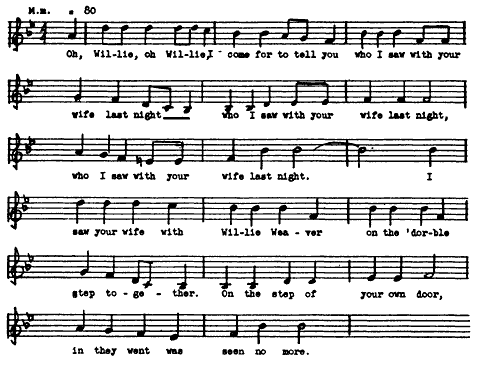
1. Oh Willie, oh Willie, I come for to tell you
Who I saw with your wife last night,
Who I saw with your wife last night,
Who I saw with your wife last night.
2. I saw your wife and Willie Weaver
On the 'dorable step together.
On the step of your own door,
In they went, was seen no more.
3. Willie come home in a terrible wonder
He knocked at the door, he knocked like thunder.
"Who come there?" the weaver cried.
"'Tis my husband, you must hide."
4. "Up the chimbley you must venture
Fore I let my husband enter,"
She cried out with a double fold.
"Get up on the chimbley pole!"
5. Willie came in with a terrible frown
He searched the house, and rooms all 'round,
He searched the house, and rooms all 'round,
A living soul there couldn't be found.
6. By the fire he was making,
Up the chimbley he was gazing,
There he spied the wretched soul
Setting on the chimbley pole.
7. It's, "Ha! Ha! Ha! How glad I've found you
Neither killed you, hanged, nor drowned you."
This he thought, nothing spoke
Built him on a rousing smoke.
8. He built him on a rousing fire,
Then the weaver, he dim higher.
There he set with a little more ease,
'Till he begin to cough and sneeze.
9. He built him on a fiery fury.
Then she cried out, "Oh great jury!
Take him down, spare his life,
And I will be your lawful wife."
10. It's down the chimbley he did take him.
Then so verily he did shake him.
Hands and face, clothes likewise,
Sent him home with two black eyes.
"Murdered Wife" ("McAfee's Confession")
This is a greatly compressed fragment omitting the stanzas concerned with throttling the wife and the last two moralizing stanzas. According to Mrs. M. M. Sonners, Warren, Indiana, this ballad is based on an actual occurrence. Belden suggests that the ballad is based on the hanging of one John McAfee at Dayton, Ohio, in 1825, Ballads and Songs, p. 317. Mrs. Sonners learned the ballad from her mother in Ohio about 1865. Louise Pound, American Ballads and Songs, No. 68; John Lomax, Cowboy Songs and Other Frontier Ballads, p. 164; Shearin and Combs, A Syllabus of Kentucky Folk-Songs, p. i6; Cox, Folk-Songs of the South, p. 192; JAF, 29 (1916), I85; Belden, Modern Philology, 2 (I904-I905), 574; JAF, 25 (1912), 12; E. J. Stout, Folklorefrom Iowa
(MAFS, Vol. 29, 1936), p. 107. (J.M.)
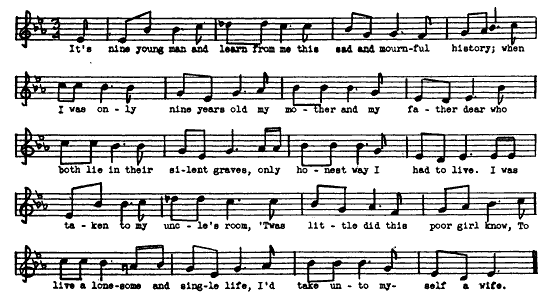
1. It's nine young men
And learn from me
This sad and mournful history.
2. When I was only nine years old,
My mother and my father dear,
Whom both lie in their silent grave,
On the honest way I had to live.
3. I was taken to my uncle's room.
'Twas little did this poor girl know,
To live a lonesome and single life,
I'd take unto myself a wife.
4. She was as good and kind to me,
As any woman need to be.
And would of lived, I have no doubt
If I never had saw this Heddy Shout.
5. All on one pleasant summer night,
All things was still, the stars shone bright.
My wife was ill, lying on her bed,
When I went to her, this I said.
6. "Dear wife, dear wife, here's medicine for you
The doctor says it will cure you."
She gave to me one tender look,
And in her lips this poison took.
7. Down on the bed by her baby
Down to the last long sleep she lay,
8. Now her head's beneath the sod,
I hope her soul is with her God,
And mine may burn in eternity.
It's all this day I'll tell to thee.
9. I'd give this world ten thousand more,
If I could only bring to life,
If I could only bring to life,
My own, my sweet dearest murdered wife.
"Henry Green"
Like "McAfee's Confession," this song is purported to be based on facts concerning a murder that took place in Berlin, New York, on Tuesday the nineteenth day of February, 1845. This is a compressing of a twenty-four
stanza broadside. Bulletin of the Folk-Song Society of the Northeast, 12 (1937), 12-18; Flanders and Brown, Vermont Folk Songs and Ballads, p. 65; Randolph, Ozark Folksongs, II, 121. (J.M.)
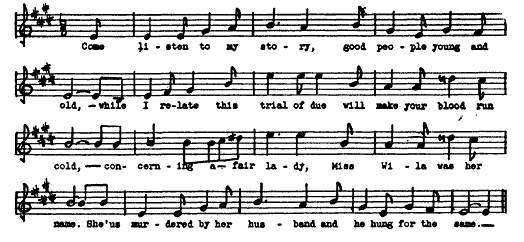
Mr. Mahoney changes the tune slightly, as most folk singers do, to fit different verses. The following is the third and fourth verse, with the slight variations noted.
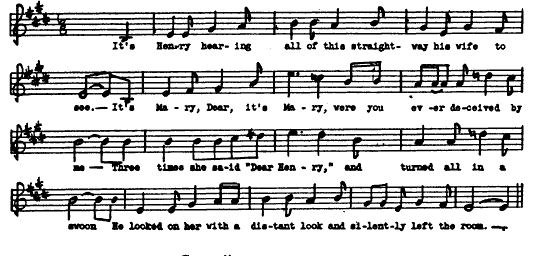
1. Come listen to my story,
Good people young and old.
While I relate this trial to you,
'Twill make your blood run cold.
2. Concerning a fair lady,
Miss Wire (Wyatt) was her name.
She's murdered by her husband
And he hung for the same.
3. Miss Wire she was beautiful,
As this you may plainly see.
Young Henry he was wealthy,
And of a high degree.
4. It's, "Mary dear," It's, "Mary,
If you'll become my wife,
I'll guide you as a parent,
Through all the cares of life."
5. "To be your wife, dear Henry,
It's freely I'll consent.
Before we would be married long,
I'm afraid you would repent.
6. "Before we would be married long,
You'd think me a disgrace.
For you are so much richer than I,
Which oft times is the case."
7. They was not married scarcely a week,
When Mary was taken ill.
Great doctors they were sent for,
To try this wonderful skill.
8. Great doctors they was sent for,
But none of them could save.
It was pronounced by all around,
"She must go to her grave."
9. Her brothers hearing all of this
Straightway their sister to see.
It's, "Sister dear," it's "Sister
You're dying, the doctors tell me."
10. It's "Sister dear," it's "Sister
Your life is now to an end.
And haven't you been poisoned,
By whom you call your friend?"
11. It's Henry hearing all of this
Straightway his wife to see.
It's "Mary dear," it's "Mary
Were you ever deceived by me?"
12. Three times she said, "Dear Henry,"
And turned all in a swoon.
He looked on her with a distant look,
And silently left the room.
13. "It's when I'm dead and buried,
Don't have my Henry hung.
It's freely I'll forgive him,
This which is more than sin."
I4. "I love him just the same now
As when he was my friend."
"Sidney Allen"
The story of Sidney and his brother Claude Allen is based on fact. Songs about both brothers are fairly common. However, the popular versions of "Claude Allen" vary widely from the one recorded here. Henry and Matteson, Southern Folklore Quarterly, 5 (1941), 142; see Richardson and Spaeth, American Mountain Songs, pp. 34, 106; Hudson, Specimens of Mississippi Folk-Lore, No. 7I; Henry, JAF, 45 (1932), I47. The song given here lacks completeness and we are left in doubt concerning the fate of the sheriff, which is typical of many of the Negro ballads. (S.P.)
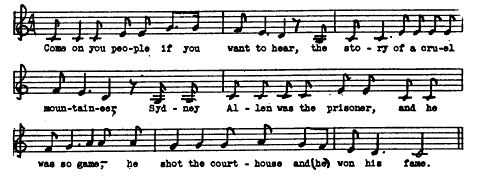
1. Come all you people, if you want to hear,
The story of a cruel mountaineer.
2. Sidney Alleyn was the prisoner, and he was so game,
He shot the courthouse and won his fame.
3. Coachman called the jury, right at half past nine.
Sidney Alleyn was the prisoner, and he was on time.
4. He mounted to the bar with his pistol in his hand,
And he sent Judge Mansfield to the promised land.
5. Just a moment later, the place was in a roar,
The dead and the dying were a-lying on the floor.
6. With a thirty-eight pistol and a thirty-eight shot,
He backed the sheriff up against the wall.
7. The Sheriff saw that he was in a mighty bad place,
The mountaineer was staring him right in the face.
8. He turned to the window and then he said,
"Just a moment more and we'll all be dead."
9. Sidney mounted to his pony and away that he did ride,
His friends and his nephews, they were riding by his side.
10. They all shook hands and swore that they would hang
Before they would give up to the Vivian Gang.
11. Sidney Alleyn wandered and he travelled all around.
Still he was captured in that western town.
12. They took poor Sidney with a ball and chain,
And they put him on that Eastbound train.
13. He arrived back home just about eleven forty one;
He met his wife and daughter and his two little son.
14. They all shook hands and they knelt down to pray,
And says, "Oh Lord, please don't take our father away."
15. The people all gathered from far and near.
To see poor Sidney sent to the electric chair.
16. Through great surprise, the judge he says,
"He's agoin'to the penitiantry instead."
"Frankie and Johnny"
Although this ballad is almost universally known it has been included because it presents some originality.
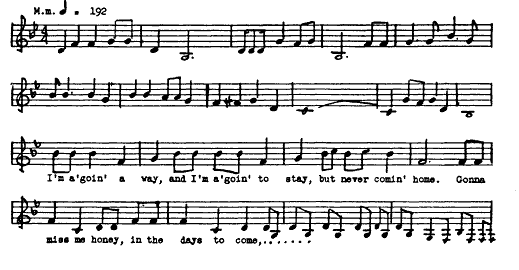
1. Frankie and Johnny were sweethearts.
They had a quarrel one day.
Johnny devowed he would leave her.
Said he was goin' away.
But never comin' home.
He was goin' away to roam.
2. Frankie got down and pleaded,
"Johnny why don't you stay?
You know honey that I done you wrong,
But please don't go away."
And Frankie sighed,
And Johnny cried.
3. "Oh, I'm agoin' away,
And I'm agoin' to stay.
But never comin' home.
"You gonna miss me honey,
In the days to come,
When the winter wind begins to blow,
An' the ground is covered up with snow.
You think of me,
You wait to be,
I'm your lovin' man.
You're gonna miss me honey,
In the days days to come."
4. Frankie saysa to Johnny,
"Say man, your hour has come."
From underneath of her kimono,
Then she drew a forty-four gun.
It was her affair,
Quit alikin' affair.
5. Johnny fled down the stairway,
Cryin' "Oh Frankie don't shoot!"
Frankie taken aim with her forty-four
Five times with the loot-it-did-shoot.
An' he fell,
An' he yell.
6. Go get your rubber tire hearses,
Go get your rubber tire hack.
Take him down into the graveyard,
For I shot him in the back,
With my great big gun,
Jus' as he went to run.
7. They put out the policemen;
Taken me right away.
Locked me down in the dungeon cell,
And throwed that key away.
Say, my Johnny's dead,
Just because he said.
8. "Oh, I'm agoin' away
And I'm agoin' to stay.
But never comin' home.
Jus' because he said;
"You gonna miss me honey,
In the days to come,
When the winter wind begins to blow,
An' the ground is covered up with snow.
You think of me,
You wait to be,
I'm your lovin' man.
You're gonna miss me honey,
In the days days to come."
"John Henry"
Songs of John Henry are legion, but this, so far as we know, is the only John Henry chant-fable. The mingling of Negro folk heroes as in the battle with Stackolee is not particularly novel, but taking John Henry to the White House and putting him in "a safe" (i.e., cupboard) is. It is not often that a snatch of the ballad leads to a scrap of the folk tale. Usually, both are considered as separate items.

John Henry told his pardner,
"Brother, you'd better pray.
The day that I miss this piece o'steel,
Tomorrow'll be your buryin' day, Lawd, Lawd.
Tomorrer be your buryin' day."
John Henry had a sweetheart.
Her name was Polly Gray.
Every time he hit that drill on the head
You'd hear poor Polly say,
"John Henry is a steel drivin' man, Lawd, Lawd.
John Henry's a steel drivin' man."
Spoken: John Henry met Stackolee one time. Both of them were very good friends. Stackolee was goin' with John Henry's Old Lady. Jus' tryin' to cut in on John Henry. At that time they were down on the Mississippi River. Now John Henry met Stackolee down on the river. Stackolee was just a little short fellow. About so tall and John Henry was a great big man. Stackolee and John Henry got into a great big argument. John Henry started to hit Stackolee. Stackolee shot the ties off John Henry's shoes. He shot the buttons off his shirt. He shot the shirt off his collar. Then John Henry turned around and smack Stackolee right down in the river. Then he run way down the Mississippi River and smack Stackolee out again. Smacked him clean out the river.
That's John Henry.
Taken John Henry to the White House
They laid him in a safe.
Ladies from the east and men from the west,
Cryin' "John Henry's a steel drivin' man."
"The Tramp" (Can I sleep in your barn all night, Mister?)
This ballad gives an interesting variant to the usual theme. Usually, one finds that the wife and son run off with a stranger and the husband later finds their graves. In this version only the son departs and the implication is kidnapping. The wife does not enter the picture. See Cambiaire, East Tennessee and Western Virginia Mountain Ballads, p. 117; also Publications of the Texas Folk-Lore Society, Vol. 6, I927. (J.M.)
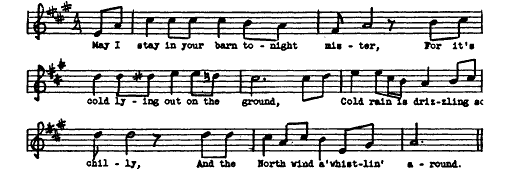
1. May I stay in your barn tonight mister,
For it's cold lying out on the ground.
Oh the cold rain is drizzling so chilly,
And the North wind's awhistling around.
2. So he asked me how long I'd been tramping,
And to live in the single of life.
"I will tell you my story, kind mister,
By cutting in my heart this same night.
3. "I once had a home and a family,
A wife and a dear little boy.
And each night when I went from my working,
My heart overflowing with joy.
4. "When I go home from my working,
There's no one to meet me at the door.
And no one to kiss me kind welcome,
Like they was there before.
5. "There was something that looked like a letter,
Placed on the marble stand,
And as soon as my eye fell upon it,
I took it right up in my hand.
6. "Oh the words that was written in that letter,
Was enough to run a man wild,
For a stranger had come from the city,
And had run off and carried my child.
7. "Oh, I passed by a big house last summer,
And I fell where my baby had died.
I knealt right down by its grave.
'Twas the first time I ever shed a tear.
8. "Oh I thought that I heard Willie's voice
Spring out from beneath the cut cod.
I thought that I heard Willie's voice
Saying, 'Leave my little angel with God.'"
"May I Sleep in Your Barn Tonight?" (B) (H.G.)
1. May I sleep in your barn tonight mister,
For it is cold lying out on the ground.
The rain is falling so chilly
And the north wind is whistling around.
2. I do not use tobacco,
Nor carry any matches to light,
I will do you no harm kind mister
If you will let me sleep in your barn overnight.
3. You ask me how long I've been tramping,
How long I've been leading this life?
To tell you the story kind mister,
Is like cutting my heart with a knife.
4. It was six years ago last summer,
I never shall forget the sad day,
When a stranger came out in the country
All dressed up so fine and so gay.
5. He was tall, erect, and good looking,
He proved to be a man who had wealth.
He wanted to stop in the country
And board there awhile for his health.
6. As I returned from my work one evening
Whistling along in my joy
I found that my wife and the stranger
Had run off and taken my boy.
7. Thanks, kind mister, it is time for me to leave,
I'll never stop tramping
Until I give the stranger the doom,
That he ought to receive.
"John Hardy"
Like "Railroad Bill," this song seems to have many variations. In fact, it might be well to suggest that those songs under strong Negro influence seem to be in an almost wholly amorphous state, to be organized and formed as the individual singer sees fit. For bibliography, see J. H. Cox, Folk-Songs of the South, pp. 175-177 for discussion; John and Alan Lomax, Folk-Song, U.S.A., pp. 306-307; J. H. Cox, JAF, 32 (1919), 505-520. (S.H.)
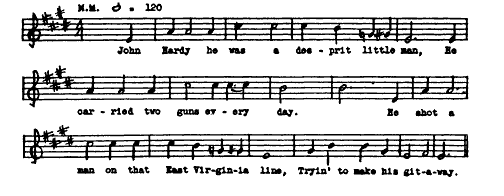
John Hardy was a desprit little man.
He carried two guns every day.
He shot a man on that East Virginia Line,
Just tryin' to make his get-a-way.
John Hardy had a pretty little gal.
The dress that she wore was blue.
She come skipping on down to the old jail house,
Sayin', "Daddy, I've been true to you."
"McKinley" (I)
Although the authors have searched until the edge of exhaustion, no references to this ballad have been found except from one James Dorcey, a Negro, aged fifty-five, resident of Newport, Rhode Island, who remembers one verse, which follows.
"T'solga T'solga (Czolgosz)
See what you have done.
You have killed our president
With a smokeless hammerless gun."
"McKinley" (II) (S.P.)
The version here recorded is the remnant of a much longer poem and owes some of its present length to borrowings from "Frankie and Johnnie."
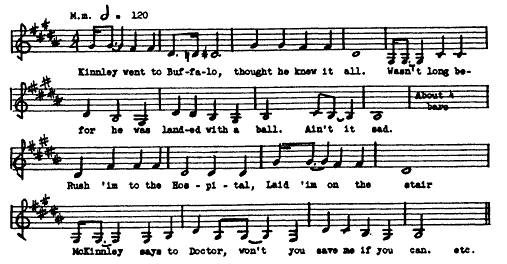
I. McKinley went to Buffalo, thought he knew it all
Wasn't long before he was landed with a ball
Ain't it sad.
2. Rush him to the hospital lay him on the stand
McKinley says to doctor, "Won't you save me if you can."
Ain't it sad.
3. People in the hospital all gather 'round
McKinley says to doctor, "Won't you please lay me down."
Ain't it sad.
4. McKinley begin to holler, McKinley begin to scream.
Doctor says, "Hand me down one bottle morphine."
Ain't it sad.
5. McKinley's wife gazed in his face.
Says, "I'm sorry. Sorry I can't take your place."
Ain't it sad.
"Huey Long"
The following ballad was composed and sung by the narrator to an audience at a talent show, and he remarked sadly that he was "cut off half way." Apparently he does not realize that, except for a few stanzas, it is identical to the ballad of McKinley, which he knows by heart. Thus is one folk song changed to another. Were he living in fertile ballad country, there is no doubt that this song, with improvements, would be picked up and sung generally. As it is, it will probably, and happily, sink into oblivion. (S.P.)
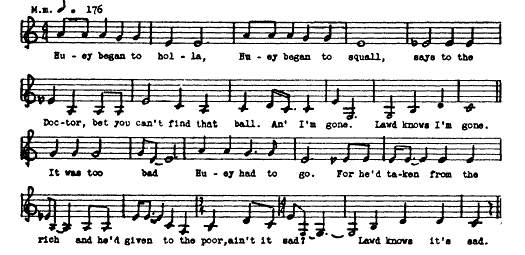
1. Oh Huey Long was a good old man
But he had to go when he can,
Ain't it sad, Lawd knows its sad.
2. Taken him to that hospital,
Laid him on that stand.
Huey says to the doctor,
"Won't you save me if you can?"
Refrain.
3. Huey begin to holler,
Huey begin to squall.
Says to the doctor, "Bet you can't find that ball
"An' I'm gone, Lawd knows I'm gone."
Refrain.
4. It was too bad Huey had to go
For he taken from the rich an' he given to the po'.
Refrain.
5. People in the hospital all gather 'round.
Huey says to the doctor, "Won't you please lay me down."
Refrain.
6. Huey's wife gazed in his face,
Says, I'm sorry. Sorry that I can't take your place."
Refrain.
7. With a steel tire buggy an' a rubber tire hack
Taken him to that cemetary an' refused to bring him back.
Refrain.
8. Guy shot Huey, taken a chance to run.
Marched him 'round Louisiana and cut him down with a gun.
Refrain.
"Jessie James"
The narrator said he once knew a great deal more of this song than the tiny fragment here. However, despite its brevity it tells about as much of the story as many of the longer narratives about dear old Jessie. Further, we are led to suspect that stanza three probably belongs at the end and not in the middle of the song. For other texts see Carl Sandburg, American Song Bag, p. 420; Louise Pound, American Ballads and Songs, p. 64; A. H. Tolman, JAF, 29 (1916), 178; John and Alan Lomax, Folk-Song U.S.A., p. 283; JAF, 45 (1932), 150; Stout p. 109. (S.P.)
1. Jessie James was a man,
Who traveled through this land,
Who robbed that Eastern, Southern Ball.
2. Robert Ford caught his eye,
And he shot him on the sly,
And they laid Jessie James in his grave.
3. Dear old Jessie, poor old Jessie-
They laid him in his grave.
4. It was a thirty-two ball,
That tumbled him from the wall,
And laid Jessie James on his grave.
"Lookin' for That Bully of The Town"
Whether this is the last stand of a ballad, or merely a folk song, would be hard to say. In its present form it is little more than a chant. However, in a Negro community the bully is somewhat of a hero. In other versions of the song the singer is hunting the bully with a gun in the hopes of killing him and becoming both the eradicator of the old bully as well as the new bully and hero himself. But, it must be admitted that as this song stands, either as a folk song or ballad, it is not far from the land where good, and bad, songs go. See H. W. Odum, JAF, 24 (1911), 293. (S.P.)
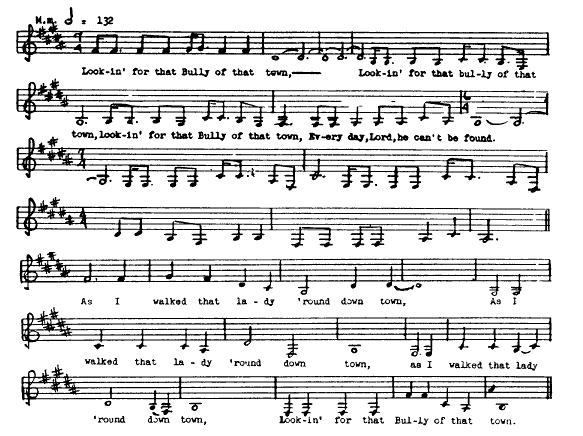
1. Lookin' for that bully of that town,
Lookin' for that bully of that town,
Lookin' for that bully of that town.
Every day, Lawd, he can't be found.
2. Repeat Stanza 1
3. As I walked that lady 'round down town,
As I walked that lady 'round down town,
As I walked that lady 'round down town.
Lookin' for that bully of that town.
No where that bully could be found.
"Railroad Bill"
Apparently there is no set pattern for this song. Instead, various short anecdotes are drawn together by singers and spun out with the hero, Railroad Bill, serving as a loose binding thread. This particular version seems to hew more closely to a single narrative line than many. Carl Sandburg, American Song Bag, p. 284; H. W. Odum, JAF, 24 (1911), 289-292; Dorothy Scarborough, On the Trail of Negro Folk Songs, pp. 251-253.

1. Railroad Bill was a desprit sport,
Shot all those buttons off that head breakman's coat.
Ain't it sad!
2. Up on the mountain, tryin' to make a jump
Hear another rumblin' from Bill's forty-four.
Ain't it sad!
3. Railroad Bill lyin' at the tank,
Wanted to catch that freight train-he grab Miss Nancy Hank.
Ain't it sad!
4. Railroad Bill, got so bad
Took all the money that the po' farmers had.
Ain't it sad!
5. Railroad Bill, got so mean,
Wouldn' eat nothin' but po'k an' bean.
Ain't it sad!
6. Railroad Bill, lyin' down asleep,
High sheriff tetched Bill-He jump forty feet.
Ain't it sad!
7. High sheriff come in the back do', Bill jumped out the winder.
You oughter seen his po' bare feet-how they scraped up cinder.
Ain't it sad!
8. Railroad Bill, lyin' at the curve,
Wanted to catch that freight-train-didn't have the nerve.
Ain't it sad.
"Mule Skinner Blues"
Various stanzas of this song are to be found in N. I. White, American Negro Folk Songs, pp. 264 and 266 under the titles "Water Boy" and "Workin' on de Railroad," respectively. The yodel perhaps is the result of
radio influence. (C.W.)
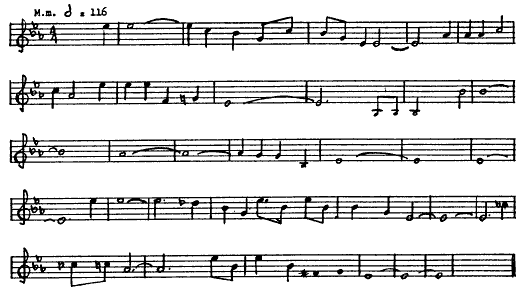
1. Good Mornin' Captain. Good mornin' shine.
That there mule skinner, don't know that mule was mine.
Odel-lea-te he he-he-oo-ee.
2. I'm goin' down-town baby, what you want me bring you back?
A walkin' cane, an' a bran' new Stetson hat.
Odel-lea-te he he-he-oo-ee.
3. Workin' on a railroad, makin' dollar-and-a-quartera day.
Gals in town on Sat'day night, they spend my little pay.
Odel-lea-te he he-he-oo-ee.
4. Look a here little waterboy, bring your water bucket roun'.
If you don' like your job, set your water bucket down.
Odel-lea-te he he-he-oo-ee.
"Look Down That Lonesome Road"
Although this is a longer version than is usually recorded, we cannot help noting that a considerable part of that length is due to extensive borrowing. Yet, owing to the already mentioned amorphous state of so much of Negro folk music, it would appear that a large mass of their songs is made up of what we might call floating lines of a cliche nature that are put in when they fit the tune and sentiment. Scarborough, On The Trail of The Negro Folk- Songs, p. 51; Lomax and Seeger, Our Singing Country, p. 404. (S.P.)
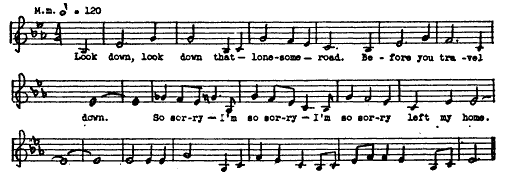
1. Look down, look down that lonesome road.
Before you travel down.
2. So sorry, I'm so sorry
I'm so sorry, left my home.
3. If I hada listened to what my po' mother said,
I wouldn't a been here today.
4. For the very best meal, babe, that I ever et.
Was at my po' mother's house.
5. I'm so sorry, I'm so sorry,
I'm so sorry that I ever left my home.
6. They say the best of friends must part sometime,
So why don't you and I?
7. Oh I'm so sorry, Lawd I'm so sorry,
I'm so sorry I ever left my home.
"Southern Jack"
This song closely parallels one with the same title in N. I. White, American Negro Folk Songs, p. 280. (S.H.)
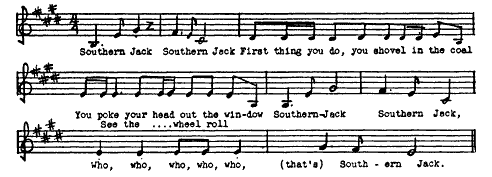
1. Southern Jack, Southern Jack,
First-thing-you-do, you-shovel-in-your-coal,
Poke-your-head-out-the-window,
See-the-drive-wheels-roll.
Southern Jack, Southern Jack,
Who, who, whooo-whooo-who,
That's Southern Jack.
2. Southern Jack, Southern Jack,
Railroad rag, railroad rag,
First thing you do,
You wake in the mornin',
Shake in the morning,
Who, who, whoo-whoo-who,
That's Southern Jack.
"Ruby"

Fifth verse is just an indistinguishable crooning on the word "Ruby."
1. Oh Ruby got drunk,
Pawned his hat and trunk.
Jes' like a po' beggar man.
2. Pawned his watch,
Pawned his chain,
Pawned his gold diamonds.
3. Oh Ruby, Ruby,
Ruby, tell me where,
Where have you been so long?
4. Oh bim-bim-bam,
Shootin' at a flam.
If you think I'm your man lay me down
5. Oh Ru-u-bee, Ru-u-bee,
Oh Ru-u-bee, Ru-u-bee.
"Home, Dearie, Home"
Although the original song has been reduced to a lyric cry it is interesting to note that the more archaic phraseology has been retained instead of the more common "the oak and the ash" that is usually found. Henry, JAF, 45 (1932), 4I; J. Colcord, p. 87.
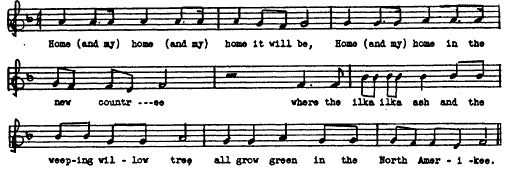
Home, and my home, and my home it will be,
Home, and my home in the new countree,
Where the ilka, ilka ash and the weeping willow tree,
All grow green in the North Amerikee.
"Fox Chase"
Years ago a Paul Bunyanish sort of fox known as Old Baldy roamed this region and could never be caught. Several stories about him are current in the area as well as this fiddle tune, purported to be about Old Baldy but the lyrics of which obviously have been culled from that great body of itinerant, cliche stanzas that seem to make up much of the Negro's folk songs. It is interesting to note the change in the song to one of social protest when sung by the Negro. See N. I. White, American Negro Folk Songs, p. 373; Lomax and Seeger, Our Singing Country, p. 403; Scarborough, On the Trail of the Negro Folk Songs, p. 221. (H.W).

Variant A
I. I'm so sorry, so sorry, so sorry
Left my home.
2. With chickens on my back,
An' hounds on my track,
Shove when I got ready, Lawdy, Lawd.
3. 'Twas through my running fast,
That I saved my life at last.
Crossed that Mason-Dixon line.
Forty-second time when the start me from that line-
Run when I got ready, Lawdy, Lawd.
Spoken: Well, they caught me in Maryland. Had to go down and spend my time.
What you think I had to do?
4. Took me down to that county jail,
Judge, he passed my mind.
With a pick an' shovel, on my back.
Trouble on my mind.
5. If I hada listened,
What my po' mother said,
Wouldn't be here today.
Hounds after me now. (Refers to guitar music when the guitar bays like a pack of hounds and then fades away in the distance.)
6. Look down, look down that lonesome road,
Before you travel down.
So sorry, so sorry, so sorry left my home.
Variant B
1. With chickens on my back,
Hounds on my track.
I got home in time.
2. With chickens on my back,
Hounds on my track,
Pullin' to my shanty, Lawdy, Lawd.
3. Chickens on my back,
Hounds on my track.
Pull when I got ready, Lawdy, Lawd.